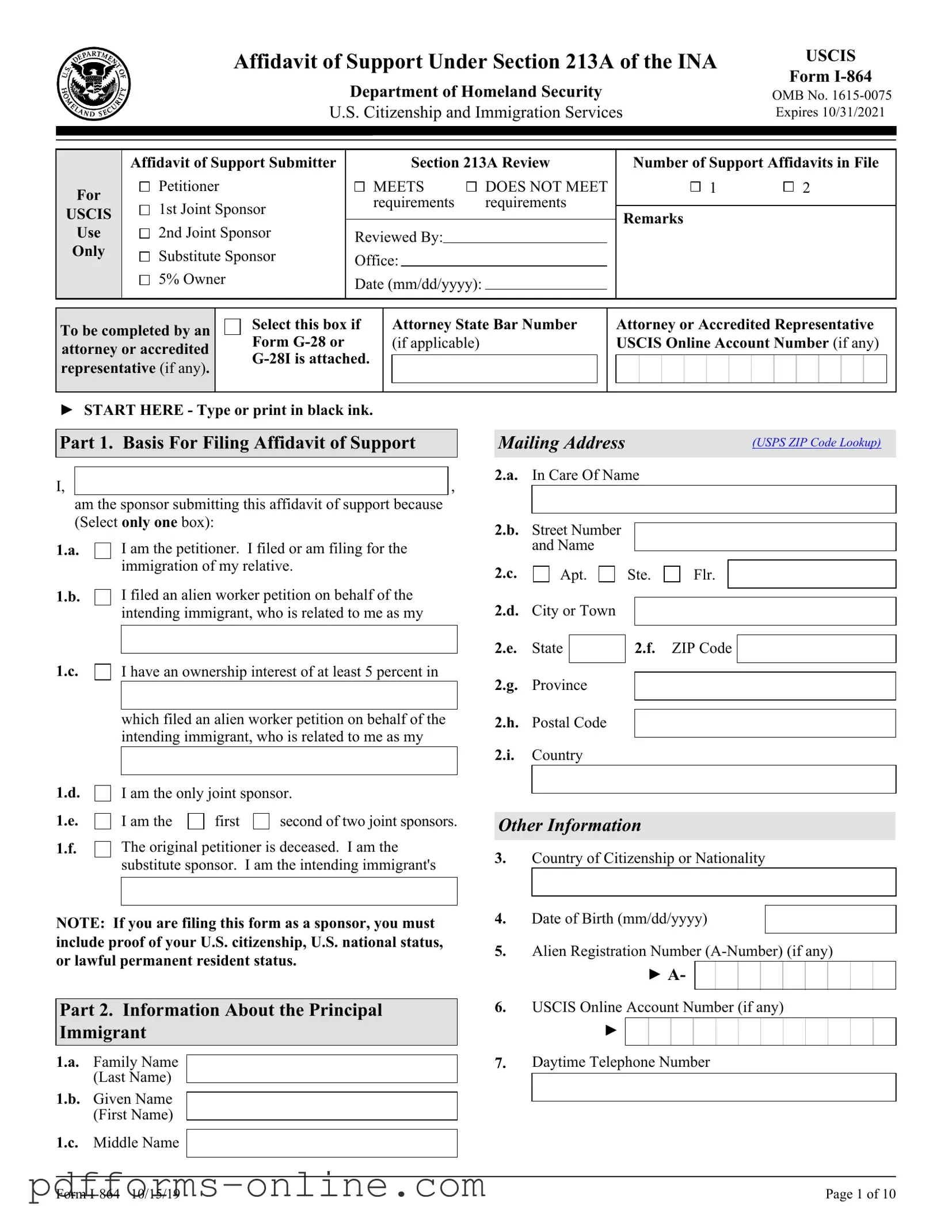Blank USCIS I-864 Template
The USCIS I-864 form, commonly known as the Affidavit of Support, plays a crucial role in the immigration process for individuals seeking to become lawful permanent residents in the United States. This form is primarily used to demonstrate that a sponsor has the financial means to support the immigrant, ensuring that they will not become reliant on government assistance. A sponsor, typically a family member or a close relative, must provide evidence of their income and assets to prove they can meet the required poverty guidelines. Completing the I-864 involves disclosing personal financial information, including income, employment status, and any dependents. It is essential for the sponsor to understand their responsibilities, as they are legally obligated to support the immigrant financially until they become a U.S. citizen or can be credited with 40 quarters of work. Additionally, the form must be submitted with other immigration documents, and any errors or omissions can lead to delays or denials in the application process. Therefore, understanding the nuances of the I-864 is vital for both sponsors and applicants navigating the complex landscape of U.S. immigration law.
Document Example
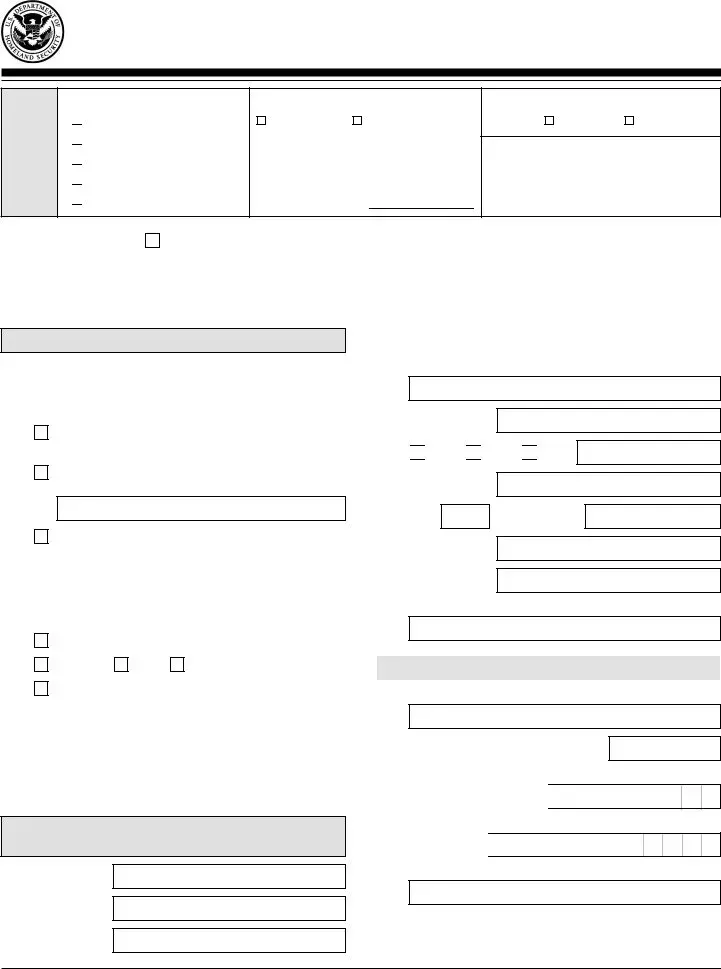
Affidavit of Support Under Section 213A of the INA |
USCIS |
|
Form |
||
Department of Homeland Security |
||
OMB No. |
||
U.S. Citizenship and Immigration Services |
Expires 10/31/2021 |
For
USCIS
Use
Only
Affidavit of Support Submitter

 Petitioner
Petitioner

 1st Joint Sponsor
1st Joint Sponsor

 2nd Joint Sponsor
2nd Joint Sponsor

 Substitute Sponsor
Substitute Sponsor

 5% Owner
5% Owner
Section 213A Review
MEETS |
DOES NOT MEET |
|||
requirements |
requirements |
|||
|
|
|
|
|
Reviewed By: |
|
|
|
|
Office: |
|
|
|
|
Date (mm/dd/yyyy):
Number of Support Affidavits in File
1 |
2 |
Remarks
To be completed by an |
Select this box if |
|
Attorney State Bar Number |
|
|
Attorney or Accredited Representative |
|
|||||||||||
Form |
|
(if applicable) |
|
|
USCIS Online Account Number (if any) |
|
||||||||||||
attorney or accredited |
|
|
|
|
||||||||||||||
|
|
|
|
|
|
|
|
|
|
|
|
|
|
|
|
|
||
representative (if any). |
|
|
|
|
|
|
|
|
|
|
|
|
|
|
|
|
|
|
|
|
|
|
|
|
|
|
|
|
|
|
|
|
|
|
|
|
|
|
|
|
|
|
|
|
|
|
|
|
|
|
|
|
|
|
|
|
|
|
|
|
|
|
|
|
|
|
|
|
|
|
|
|
|
|
|
►START HERE - Type or print in black ink.
Part 1. Basis For Filing Affidavit of Support
I, |
|
, |
am the sponsor submitting this affidavit of support because (Select only one box):
1.a. |
I am the petitioner. I filed or am filing for the |
|
immigration of my relative. |
1.b. |
I filed an alien worker petition on behalf of the |
|
intending immigrant, who is related to me as my |
Mailing Address |
(USPS ZIP Code Lookup) |
|
|
2.a. In Care Of Name
2.b. Street Number
and Name
2.c. 
 Apt.
Apt. 
 Ste.
Ste. 
 Flr.
Flr.
2.d. City or Town
1.c. |
I have an ownership interest of at least 5 percent in |
|
|
|
which filed an alien worker petition on behalf of the |
|
intending immigrant, who is related to me as my |
1.d. |
|
I am the only joint sponsor. |
2.e. State
2.g. Province
2.h. Postal Code 2.i. Country
2.f. ZIP Code
1.e. |
I am the |
first |
second of two joint sponsors. |
1.f. |
The original petitioner is deceased. I am the |
||
|
substitute sponsor. I am the intending immigrant's |
||
|
|
|
|
|
|
|
|
NOTE: If you are filing this form as a sponsor, you must include proof of your U.S. citizenship, U.S. national status, or lawful permanent resident status.
Other Information
3.Country of Citizenship or Nationality
4.Date of Birth (mm/dd/yyyy)
5.Alien Registration Number
►A- 






Part 2. Information About the Principal Immigrant
1.a. Family Name
(Last Name)
1.b. Given Name
(First Name)
1.c. Middle Name
6.USCIS Online Account Number (if any)
►







7.Daytime Telephone Number
Form |
Page 1 of 10 |
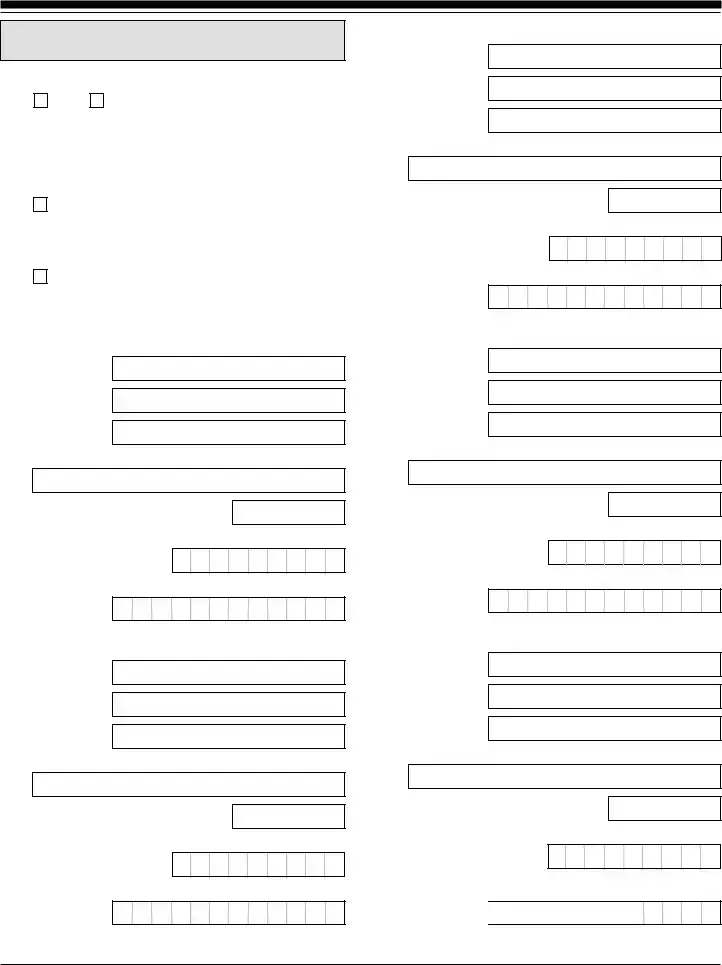
Part 3. Information About the Immigrants You Are Sponsoring
1.I am sponsoring the principal immigrant named in Part 2.
Yes |
No (Applicable only if you are sponsoring |
|
family members in Part 3. as the second |
|
joint sponsor or if you are sponsoring |
|
family members who are immigrating |
|
more than six months after the principal |
|
immigrant) |
2. I am sponsoring the following family members immigrating at the same time or within six months of the principal immigrant named in Part 2. (Do not include any relative listed on a separate visa petition.)
3. I am sponsoring the following family members who are immigrating more than six months after the principal immigrant.
Family Member 1
4.a. Family Name
(Last Name)
4.b. Given Name
(First Name)
4.c. Middle Name
5.Relationship to Principal Immigrant
6. Date of Birth (mm/dd/yyyy)
7.Alien Registration Number
► A-
8.USCIS Online Account Number (if any)
►
Family Member 2
9.a. Family Name
(Last Name)
9.b. Given Name
(First Name)
9.c. Middle Name
10.Relationship to Principal Immigrant
11. Date of Birth (mm/dd/yyyy)
12.Alien Registration Number
► A-
13.USCIS Online Account Number (if any)
►
Family Member 3
14.a. Family Name
(Last Name)
14.b. Given Name
(First Name)
14.c. Middle Name
15.Relationship to Principal Immigrant
16.Date of Birth (mm/dd/yyyy)
17.Alien Registration Number
► A-
18.USCIS Online Account Number (if any)
►
Family Member 4
19.a. Family Name
(Last Name)
19.b. Given Name
(First Name)
19.c. Middle Name
20.Relationship to Principal Immigrant
21.Date of Birth (mm/dd/yyyy)
22.Alien Registration Number
► A-
23.USCIS Online Account Number (if any)
►
Family Member 5
24.a. Family Name
(Last Name)
24.b. Given Name
(First Name)
24.c. Middle Name
25.Relationship to Principal Immigrant
26.Date of Birth (mm/dd/yyyy)
27.Alien Registration Number
► A-
28.USCIS Online Account Number (if any)
►







Form |
Page 2 of 10 |

Part 3. Information About the Immigrants You Are Sponsoring (continued)
29. Enter the total number of immigrants you are sponsoring on |
this affidavit which includes the principal immigrant listed |
in Part 2., any immigrants listed in Part 3., Item |
Numbers 1. - 28. and (if applicable), any immigrants listed |
for these questions in Part 11. Additional Information. |
Do not count the principal immigrant if you are only |
Sponsor's Physical Address
4.a. Street Number
and Name
4.b. 
 Apt.
Apt. 
 Ste.
Ste. 
 Flr.
Flr.
4.c. City or Town
sponsoring family members entering more than 6 months |
after the principal immigrant. |
Part 4. Information About You (Sponsor)
Sponsor's Full Name
4.d. State
4.f. Province
4.g. Postal Code
4.h. Country
4.e. ZIP Code
1.a. Family Name
(Last Name)
1.b. Given Name
(First Name)
1.c. Middle Name
Sponsor's Mailing Address
2.a. In Care Of Name
2.b. Street Number
and Name
2.c. 
 Apt.
Apt. 
 Ste.
Ste. 
 Flr.
Flr.
2.d. City or Town
2.e. State |
|
2.f. ZIP Code |
|
|
|
2.g. Province
2.h. Postal Code
2.i. Country
3.Is your current mailing address the same as your physical
address? |
Yes |
No |
|
If you answered "No" to Item Number 3., provide your physical address in Item Numbers 4.a. - 4.h.
Other Information
5.Country of Domicile
6. Date of Birth (mm/dd/yyyy)
7.City or Town of Birth
8.State or Province of Birth
9.Country of Birth
10.U.S. Social Security Number (Required)
|
► |
|
|
|
|
|
|
|
|
|
Citizenship or Residency |
|
|
|
|
|
|
||||
11.a. |
I am a U.S. citizen. |
|||||||||
11.b. |
I am a U.S. national. |
|||||||||
11.c. |
I am a lawful permanent resident. |
|||||||||
12.Sponsor's
► A-
13.Sponsor's USCIS Online Account Number (if any)
►
Military Service (To be completed by petitioner sponsors only.)
14.I am currently on active duty in the U.S. Armed Forces
or U.S. Coast Guard. |
Yes |
No |
|
Form |
Page 3 of 10 |
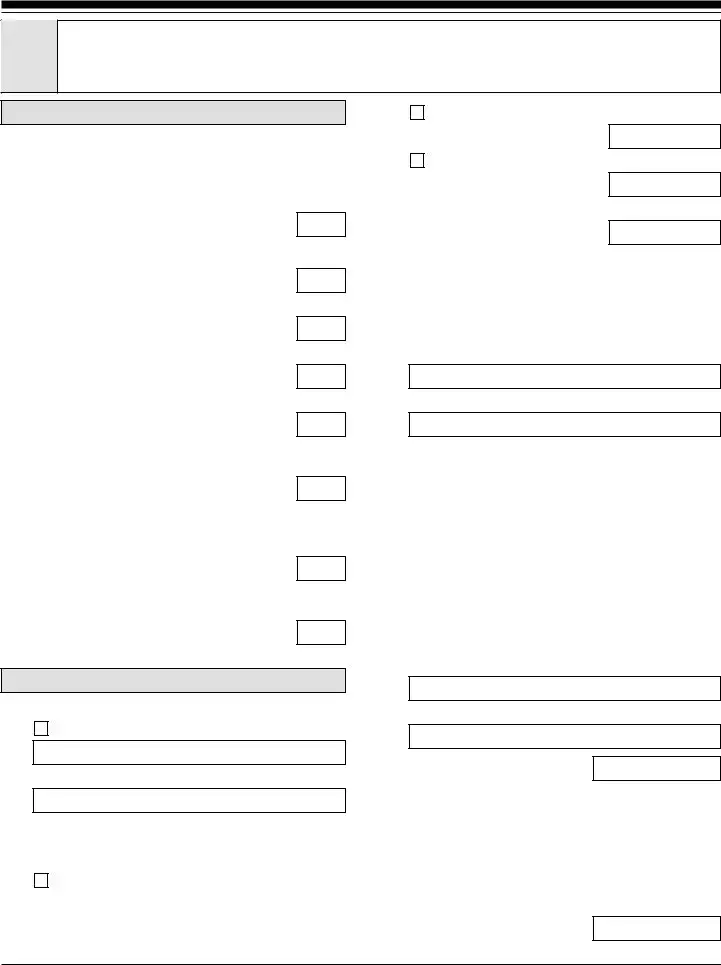
For
USCIS
Use
Only
Part 5. Sponsor's Household Size
NOTE: Do not count any member of your household more than once.
Persons you are sponsoring in this affidavit:
5.
6.
Retired Since (mm/dd/yyyy)
Unemployed Since (mm/dd/yyyy)
1.Provide the number you entered in Part 3., Item Number
29.
Persons NOT sponsored in this affidavit:
2. Yourself.
3.If you are currently married, enter "1" for your spouse.
4.If you have dependent children, enter the number here.
5.If you have any other dependents, enter the number here.
6.If you have sponsored any other persons on Form
enter the number here.
7.OPTIONAL: If you have siblings, parents, or adult children with the same principal residence who are combining their income with yours by submitting Form
8.Add together Part 5., Item Numbers 1. - 7. and enter the number here.
Household Size:
Part 6. Sponsor's Employment and Income
I am currently:
1. Employed as a/an
2.Name of Employer 1
7.My current individual annual income is:
$
Income you are using from any other person who was counted in your household size, including, in certain conditions, the intending immigrant. (See Form
Person 1
8.Name
9.Relationship
10. |
Current Income |
$ |
|
Person 2 |
|
|
|
|
|
||
11. |
Name |
|
|
|
|
|
|
12. |
Relationship |
|
|
|
|
|
|
13. |
Current Income |
$ |
|
|
|||
|
|
|
|
Person 3
14.Name
15.Relationship
16. Current Income |
$ |
Person 4
3. Name of Employer 2 (if applicable) |
17. Name |
||
|
|
|
|
4.
18. |
Relationship |
|
|
|
|
|
|
|
|
|
|
19. Current Income |
$ |
Form |
Page 4 of 10 |
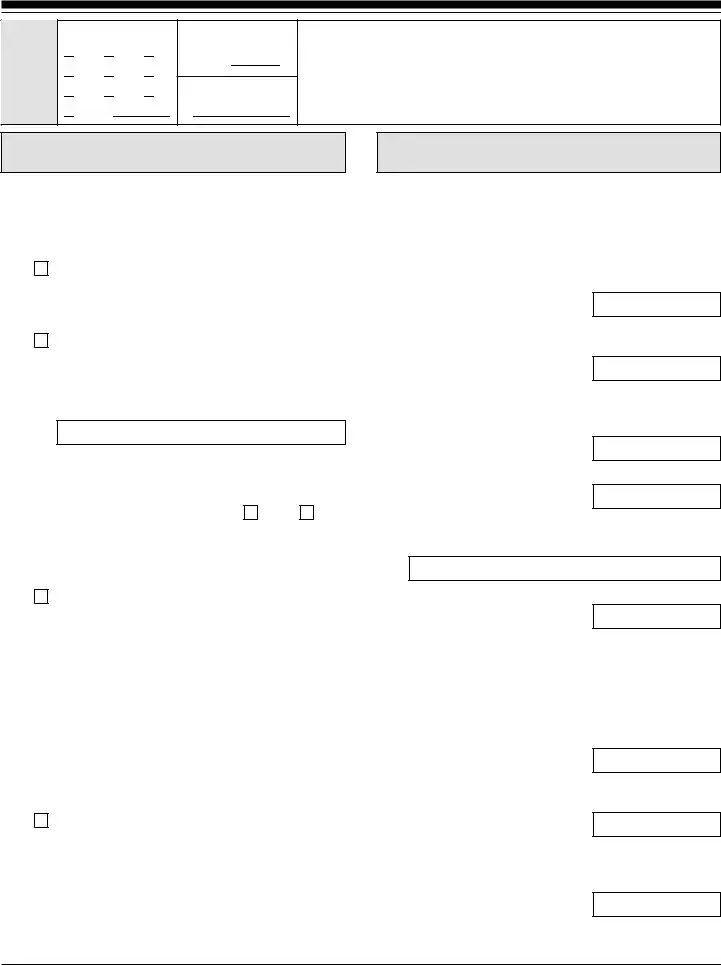
For
USCIS
Use
Only
Household Size

 1
1 
 2
2  3
3

 4
4 
 5
5  6
6

 7
7 
 8
8  9
9

 Other
Other
Poverty Guideline
Year: 2 0
Poverty Line:
$
Remarks
Part 6. Sponsor's Employment and Income
(continued)
20.My Current Annual Household Income (Total all lines from Part 6. Item Numbers 7., 10., 13., 16., and 19.; the total will be compared to Federal Poverty Guidelines on
|
Form |
$ |
|
|
|
|
|
|
|
|
|
21. |
The people listed in Item Numbers 8., 11., 14., and |
||
17.have completed Form
22. One or more of the people listed in Item Numbers 8., 11., 14., and 17. do not need to complete Form
Name
Federal Income Tax Return Information
23.a. Have you filed a Federal income tax return for each of the
three most recent tax years? |
Yes |
No |
|
NOTE: You MUST attach a photocopy or transcript of your Federal income tax return for only the most recent tax year.
23.b. (Optional) I have attached photocopies or transcripts of my Federal income tax returns for my second and third most recent tax years.
My total income (adjusted gross income on Internal Revenue Service (IRS) Form 1040EZ) as reported on my Federal income tax returns for the most recent three years was:
|
Tax Year |
|
Total Income |
24.a. Most Recent |
|
$ |
|
24.b. 2nd Most Recent |
|
$ |
|
|
|
||
24.c. 3rd Most Recent |
|
$ |
|
|
|
||
|
|
|
|
25. I was not required to file a Federal income tax return as my income was below the IRS required level and I have attached evidence to support this.
Part 7. Use of Assets to Supplement Income
(Optional)
If your income, or the total income for you and your household, from Part 6., Item Numbers 20. or 24.a. - 24.c., exceeds the Federal Poverty Guidelines for your household size, YOU ARE NOT REQUIRED to complete this Part 7. Skip to Part 8.
Your Assets (Optional)
1.Enter the balance of all savings and checking accounts.
$
2.Enter the net cash value of
$
3.Enter the net cash value of all stocks, bonds, certificates of deposit, and any other assets not already included in Item Number 1. or Item Number 2.
$
4.Add together Item Numbers 1. - 3. and enter the number
here. |
TOTAL: $ |
|
Assets from Form
5.a. Name of Relative
5.b. Your household member's assets from Form
(optional).$
Assets of the principal sponsored immigrant (optional).
The principal sponsored immigrant is the person listed in Part 2., Item Numbers 1.a. - 1.c. Only include the assets if the principal immigrant is being sponsored by this affidavit of support.
6.Enter the balance of the principal immigrant's savings and
checking accounts. |
$ |
|
7.Enter the net cash value of all the principal immigrant's real estate holdings. (Net value means investment value
minus mortgage debt.) |
$ |
|
8.Enter the current cash value of the principal immigrant's stocks, bonds, certificates of deposit, and other assets not included in Item Number 6. or Item Number 7.
$
Form |
Page 5 of 10 |
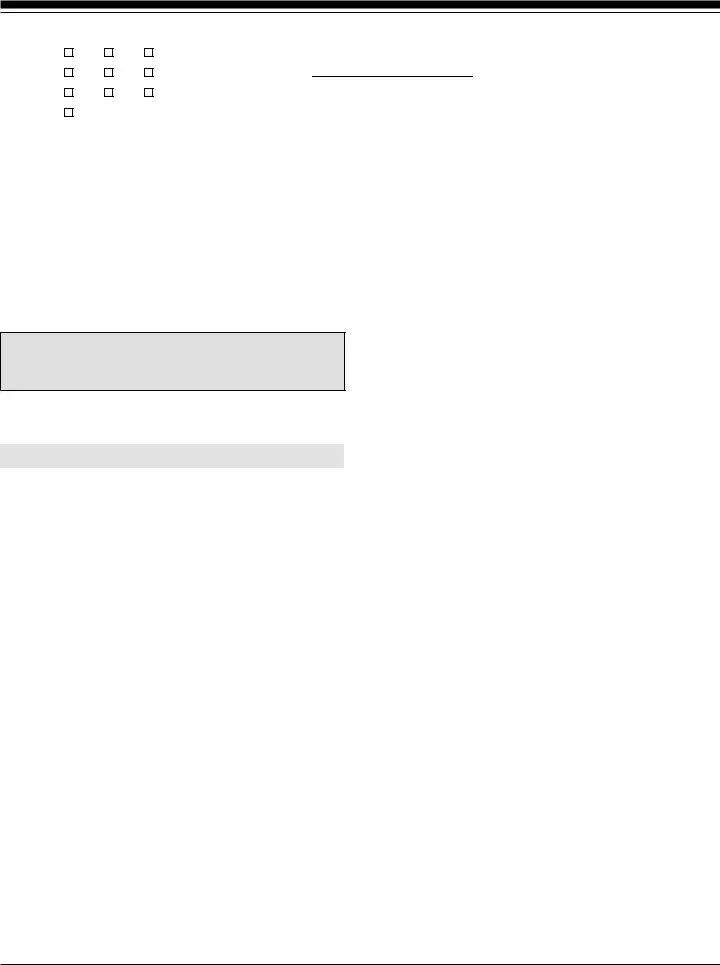
|
Household Size |
|
|
Poverty Guideline |
Sponsor's Household Income |
Remarks |
|||||
For |
1 |
2 |
3 |
|
|
Year: 2 0 |
(Page 5, Line 10) |
|
|||
|
|
|
|
|
|||||||
USCIS |
4 |
5 |
6 |
|
|
$ |
|
||||
|
|
|
|
|
|
|
|||||
Use |
|
|
|
|
|
|
|
||||
7 |
8 |
9 |
|
|
Poverty Line: |
The total value of all assets, line 10, must equal 5 times (3 times for spouses and children of |
|||||
Only |
|
|
|||||||||
|
|
|
|
|
|
|
|
|
USC's, or 1 time for orphans to be formally adopted in the U.S.) the difference between the |
||
|
Other |
|
|
|
$ |
|
|
|
|
||
|
|
|
|
|
|
|
|
poverty guidelines and the sponsor's household income, line 10. |
|||
|
|
|
|
|
|
|
|
|
|
|
|
Part 7. Use of Assets to Supplement Income |
What If I Choose Not to Sign Form |
||||
(Optional) (continued) |
|
|
The U.S. Government cannot make you sign Form |
||
9. |
Add together Item Numbers 6. - 8. and enter the number |
do not want to do so. But if you do not sign Form |
|||
intending immigrant may not become a lawful permanent |
|||||
|
here. |
$ |
|
||
|
|
||||
|
|
resident in the United States. |
|||
|
|
|
|||
|
|
|
|
||
Total Value of Assets |
|
|
What Does Signing Form |
||
|
|
|
|
||
10. |
Add together Item Numbers 4., 5.b., and 9. and enter the |
If an intending immigrant becomes a lawful permanent resident |
|||
|
number here. |
|
|
||
|
|
|
in the United States based on a Form |
||
|
TOTAL: $ |
|
|||
|
|
||||
|
|
signed, then, until your obligations under Form |
|||
|
|
|
|
||
|
|
|
|
you must: |
|
Part 8. Sponsor's Contract, Statement, Contact
Information, Declaration, Certification, and
Signature
NOTE: Read the Penalties section of the Form
Sponsor's Contract
Please note that, by signing this Form
What is the Legal Effect of My Signing Form
If you sign Form
Under this contract, you agree that, in deciding whether the intending immigrant can establish that he or she is not inadmissible to the United States as a person likely to become a public charge, the U.S. Government can consider your income and assets as available for the support of the intending immigrant.
A.Provide the intending immigrant any support necessary to maintain him or her at an income that is at least 125 percent of the Federal Poverty Guidelines for his or her household size (100 percent if you are the petitioning sponsor and are on active duty in the U.S. Armed Forces or U.S. Coast Guard, and the person is your husband, wife, or unmarried child under 21 years of age); and
B.Notify U.S. Citizenship and Immigration Services (USCIS) of any change in your address, within 30 days of the change, by filing Form
What Other Consequences Are There?
If an intending immigrant becomes a lawful permanent resident in the United States based on a Form
This provision does not apply to public benefits specified in section 403(c) of the Welfare Reform Act such as emergency Medicaid,
What If I Do Not Fulfill My Obligations?
If you do not provide sufficient support to the person who becomes a lawful permanent resident based on a Form
Form |
Page 6 of 10 |
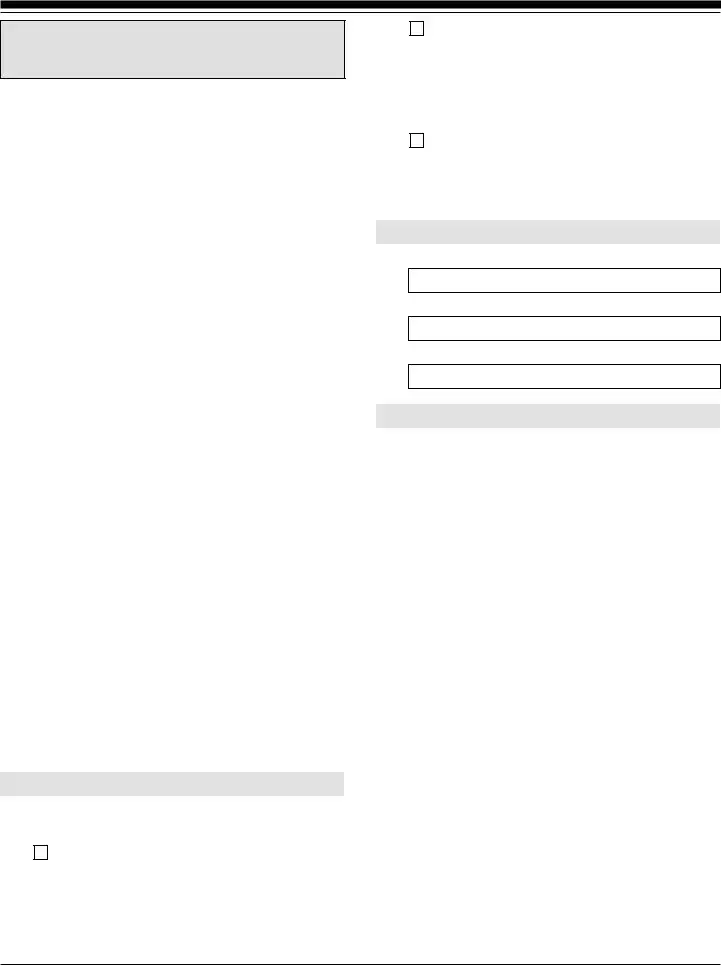
Part 8. Sponsor's Contract, Statement, Contact
Information, Declaration, Certification, and
Signature (continued)
If a Federal, state, local, or private agency provided any covered
If you are sued, and the court enters a judgment against you, the person or agency that sued you may use any legally permitted procedures for enforcing or collecting the judgment. You may also be required to pay the costs of collection, including attorney fees.
If you do not file a properly completed Form
When Will These Obligations End?
Your obligations under a Form
A.Becomes a U.S. citizen;
B.Has worked, or can receive credit for, 40 quarters of coverage under the Social Security Act;
C.No longer has lawful permanent resident status and has departed the United States;
D.Is subject to removal, but applies for and obtains, in removal proceedings, a new grant of adjustment of status, based on a new affidavit of support, if one is required; or
E.Dies.
NOTE: Divorce does not terminate your obligations under Form
Your obligations under a Form
Sponsor's Statement
NOTE: Select the box for either Item Number 1.a. or 1.b. If applicable, select the box for Item Number 2.
1.a. |
I can read and understand English, and I have read |
|
and understand every question and instruction on this |
|
affidavit and my answer to every question. |
1.b. |
The interpreter named in Part 9. read to me every |
|
|
question and instruction on this affidavit and my |
|
|
answer to every question in |
|
|
|
|
|
|
, |
|
a language in which I am fluent, and I understood |
|
|
everything. |
|
2. |
At my request, the preparer named in Part 10., |
|
|
|
, |
|
prepared this affidavit for me based only upon |
|
|
information I provided or authorized. |
|
Sponsor's Contact Information
3.Sponsor's Daytime Telephone Number
4.Sponsor's Mobile Telephone Number (if any)
5.Sponsor's Email Address (if any)
Sponsor's Declaration and Certification
Copies of any documents I have submitted are exact photocopies of unaltered, original documents, and I understand that USCIS or the U.S. Department of State (DOS) may require that I submit original documents to USCIS or DOS at a later date. Furthermore, I authorize the release of any information from any and all of my records that USCIS or DOS may need to determine my eligibility for the benefit that I seek.
I furthermore authorize release of information contained in this affidavit, in supporting documents, and in my USCIS or DOS records, to other entities and persons where necessary for the administration and enforcement of U.S. immigration law.
I certify, under penalty of perjury, that all of the information in my affidavit and any document submitted with it were provided or authorized by me, that I reviewed and understand all of the information contained in, and submitted with, my affidavit and that all of this information is complete, true, and correct.
A.I know the contents of this affidavit of support that I signed;
B.I have read and I understand each of the obligations described in Part 8., and I agree, freely and without any mental reservation or purpose of evasion, to accept each of those obligations in order to make it possible for the immigrants indicated in Part 3. to become lawful permanent residents of the United States;
C.I agree to submit to the personal jurisdiction of any Federal or state court that has subject matter jurisdiction of a lawsuit against me to enforce my obligations under this Form
Form |
Page 7 of 10 |
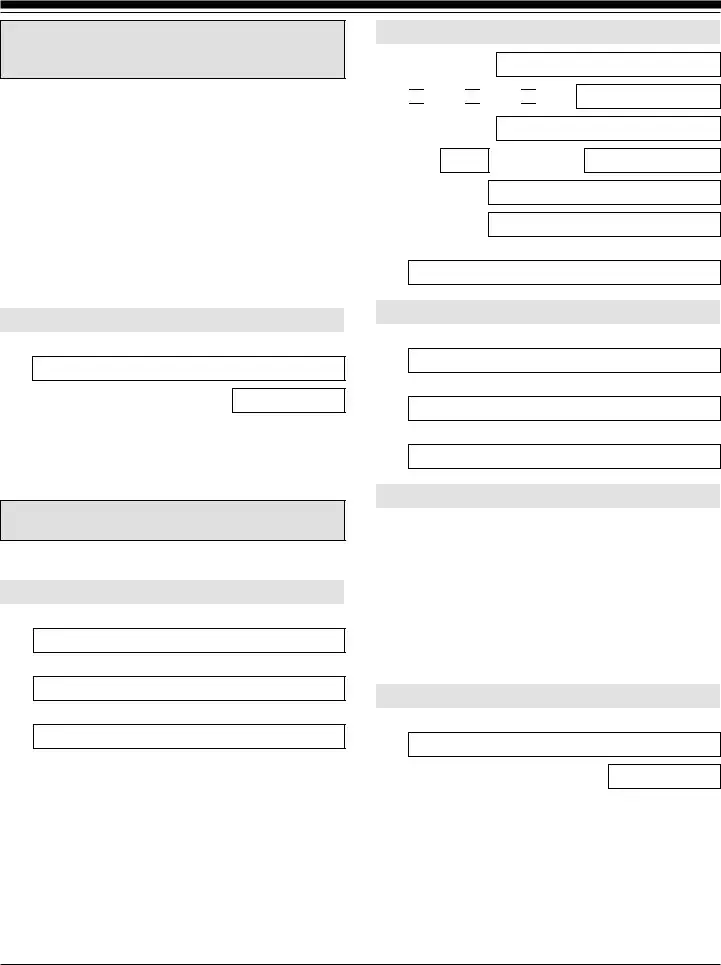
Part 8. Sponsor's Contract, Statement, Contact Information, Declaration, Certification, and
Signature (continued)
D. |
Each of the Federal income tax returns submitted in |
|
support of this affidavit are true copies, or are |
|
unaltered tax transcripts, of the tax returns I filed |
|
with the IRS; |
Interpreter's Mailing Address
3.a. Street Number
and Name
3.b. 
 Apt.
Apt. 
 Ste.
Ste. 
 Flr.
Flr.
3.c. City or Town
E. |
I understand that, if I am related to the sponsored |
|
immigrant by marriage, the termination of the |
|
marriage (by divorce, dissolution, annulment, or |
|
other legal process) will not relieve me of my |
|
obligations under this Form |
F. |
I authorize the Social Security Administration to |
|
release information about me in its records to |
|
USCIS and DOS. |
3.d. State
3.f. Province
3.g. Postal Code
3.h. Country
3.e. ZIP Code
Sponsor's Signature
6.a. Sponsor's Signature
6.b. Date of Signature (mm/dd/yyyy)
NOTE TO ALL SPONSORS: If you do not completely fill out this affidavit or fail to submit required documents listed in the Instructions, USCIS or DOS may deny your affidavit.
Part 9. Interpreter's Contact Information, Certification, and Signature
Provide the following information about the interpreter.
Interpreter's Full Name
1.a. Interpreter's Family Name (Last Name)
1.b. Interpreter's Given Name (First Name)
2.Interpreter's Business or Organization Name (if any)
Interpreter's Contact Information
4.Interpreter's Daytime Telephone Number
5.Interpreter's Mobile Telephone Number (if any)
6.Interpreter's Email Address (if any)
Interpreter's Certification
I certify, under penalty of perjury, that:
I am fluent in English and |
|
, |
which is the same language specified in Part 8., Item Number 1.b., and I have read to this sponsor in the identified language every question and instruction on this affidavit and his or her answer to every question. The sponsor informed me that he or she understands every instruction, question, and answer on the affidavit, including the Sponsor's Declaration and Certification, and has verified the accuracy of every answer.
Interpreter's Signature
7.a. Interpreter's Signature
7.b. Date of Signature (mm/dd/yyyy)
Form |
Page 8 of 10 |
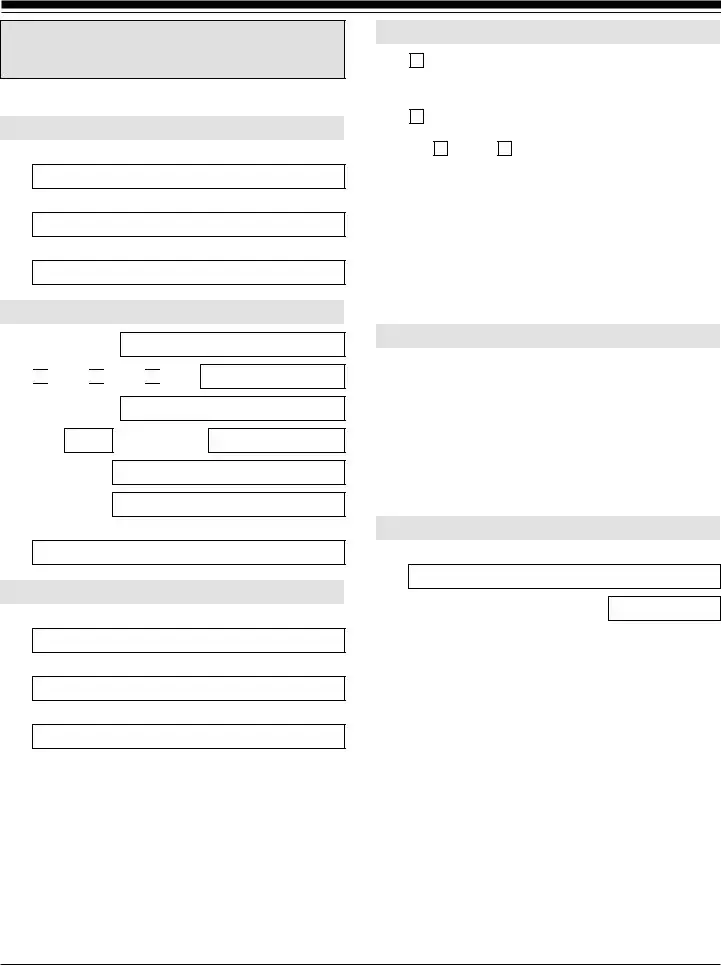
Part 10. Contact Information, Declaration, and Signature of the Person Preparing this Affidavit, if Other Than the Sponsor
Provide the following information about the preparer.
Preparer's Full Name
1.a. Preparer's Family Name (Last Name)
1.b. Preparer's Given Name (First Name)
2.Preparer's Business or Organization Name (if any)
Preparer's Mailing Address
3.a. Street Number
and Name
3.b. 
 Apt.
Apt. 
 Ste.
Ste. 
 Flr.
Flr.
3.c. City or Town
Preparer's Statement
7.a. |
I am not an attorney or accredited representative but |
|
|
have prepared this affidavit on behalf of the sponsor |
|
|
and with the sponsor's consent. |
|
7.b. |
I am an attorney or accredited representative and my |
|
|
representation of the sponsor in this case |
|
|
extends |
does not extend beyond the |
preparation of this affidavit.
NOTE: If you are an attorney or accredited representative, you may be obliged to submit a completed Form
Preparer's Certification
By my signature, I certify, under penalty of perjury, that I prepared this affidavit at the request of the sponsor. The sponsor then reviewed this completed affidavit and informed me that he or she understands all of the information contained in, and submitted with, his or her affidavit, including the
3.d. State
3.f. Province
3.g. Postal Code
3.h. Country
3.e. ZIP Code
Sponsor's Declaration and Certification, and that all of this information is complete, true, and correct. I completed this affidavit based only on information that the sponsor provided to me or authorized me to obtain or use.
Preparer's Signature
8.a. Preparer's Signature
Preparer's Contact Information
4.Preparer's Daytime Telephone Number
5.Preparer's Mobile Telephone Number (if any)
6.Preparer's Email Address (if any)
8.b. Date of Signature (mm/dd/yyyy)
Form |
Page 9 of 10 |
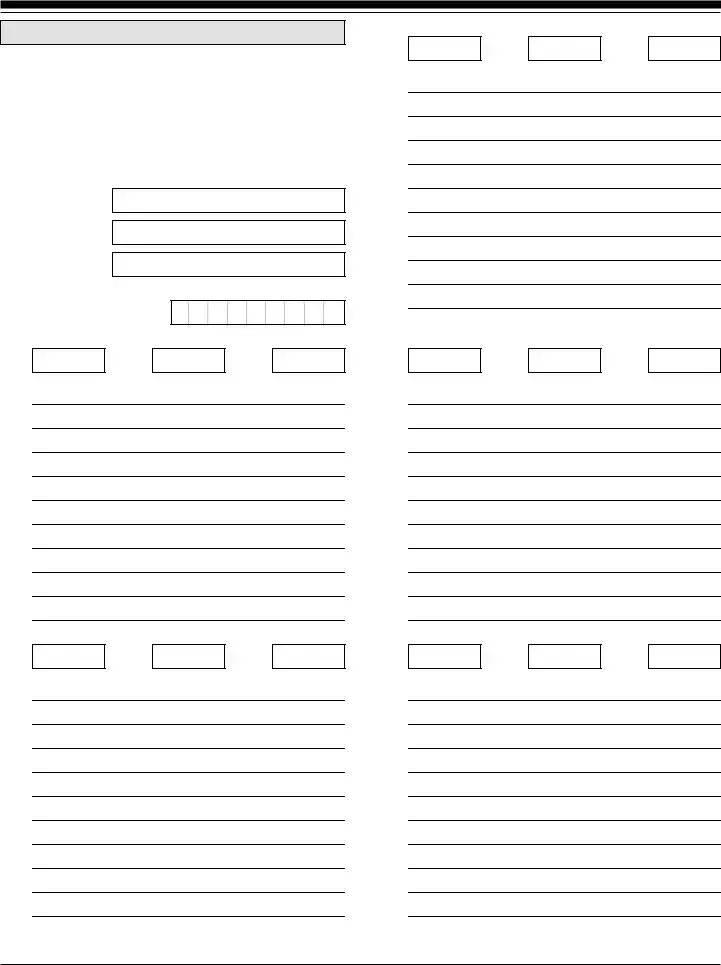
Part 11. Additional Information
If you need extra space to provide any additional information within this affidavit, use the space below. If you need more space than what is provided, you may make copies of this page to complete and file with this affidavit or attach a separate sheet of paper. Type or print your name and
1.a. Family Name
(Last Name)
1.b. Given Name
(First Name)
1.c. Middle Name
2.
► A-
3.a. Page Number 3.b. Part Number 3.c. Item Number
3.d.
4.a. Page Number 4.b. Part Number 4.c. Item Number
4.d.
5.a. Page Number 5.b. Part Number 5.c. Item Number
5.d.
6.a. Page Number 6.b. Part Number 6.c. Item Number
6.d.
7.a. Page Number 7.b. Part Number 7.c. Item Number
7.d.
Form |
Page 10 of 10 |
Frequently Asked Questions
-
What is the USCIS I-864 form?
The USCIS I-864 form, also known as the Affidavit of Support, is a document that U.S. citizens and permanent residents must complete when sponsoring a relative for a green card. This form demonstrates that the sponsor has adequate financial means to support the immigrant and ensures that the immigrant will not become a public charge.
-
Who needs to file the I-864 form?
Generally, the I-864 form must be filed by any U.S. citizen or lawful permanent resident who is sponsoring a family member for immigration. This includes spouses, children, parents, and siblings. If the sponsor does not meet the income requirements, a joint sponsor can also submit an I-864 form to help meet the financial criteria.
-
What are the income requirements for the I-864?
The sponsor must demonstrate an income that is at least 125% of the federal poverty guidelines, based on household size. For active duty military members sponsoring their spouse or child, the requirement is only 100% of the poverty guidelines. It’s important to check the current poverty guidelines, as they can change annually.
-
What documents do I need to submit with the I-864?
When filing the I-864, you should include:
- Your most recent federal tax return.
- W-2 forms or 1099s from the last tax year.
- Evidence of current employment, such as a pay stub.
- Proof of assets, if your income does not meet the requirements.
Providing complete and accurate documentation is crucial to avoid delays in processing.
-
What happens after I submit the I-864 form?
After submission, USCIS will review the I-864 as part of the overall immigration application. If everything is in order, the application will proceed to the next steps. However, if there are issues or missing information, USCIS may issue a Request for Evidence (RFE). It’s important to respond promptly to any RFEs to keep the application moving forward.
Misconceptions
- The I-864 form is only for family-based immigration. While it is primarily used for family-sponsored immigrants, it can also apply to certain employment-based immigrants who have a qualifying family member.
- Only the petitioner needs to sign the I-864 form. In fact, both the petitioner and the sponsor must sign the form. This ensures that both parties understand their financial responsibilities.
- Submitting the I-864 guarantees that the immigrant will receive a green card. This form is just one part of the application process. Approval of the green card depends on meeting all requirements set by USCIS.
- Any income can be used to meet the financial requirements. Not all income counts. Only specific types of income, such as wages, can be considered. Additionally, the income must meet the required threshold.
- Once the I-864 is submitted, the sponsor has no further obligations. This is a misconception. The sponsor remains financially responsible for the immigrant until they become a U.S. citizen or can be credited with 40 quarters of work.
- The I-864 form is only necessary for the initial application. This is incorrect. The form may be required again if the immigrant applies for certain benefits or if the sponsor's financial situation changes.
- All sponsors must meet the same income requirements. Different income requirements apply based on the size of the household. The number of dependents and the immigrant being sponsored will affect these calculations.
- Submitting the I-864 is a one-time process. In reality, the obligations may continue for many years. If the immigrant receives public benefits, the sponsor may be required to repay those costs.
Common mistakes
-
Not using the most current version of the form. USCIS updates forms periodically. Using an outdated version can lead to delays or rejections.
-
Failing to sign the form. A signature is required. Without it, the application may be considered incomplete.
-
Incorrectly calculating household size. It’s essential to include everyone who lives with you and any dependents you claim on your tax return.
-
Providing inaccurate income information. Ensure that the income reported matches your most recent tax return and any supporting documents.
-
Neglecting to include supporting documents. Attach necessary evidence, such as tax returns, W-2s, or pay stubs, to verify your income.
-
Not disclosing all required sponsors. If there are joint sponsors, their information must also be included on the form.
-
Using inconsistent information. All details provided must match across various documents. Inconsistencies can raise red flags.
-
Ignoring instructions for the form. Each section has specific instructions. Read them carefully to avoid common pitfalls.
-
Submitting the form without reviewing it. A thorough review can catch errors before submission, preventing delays.
-
Not keeping copies of submitted documents. Retaining copies of everything sent to USCIS is crucial for future reference and follow-up.
Additional PDF Templates
Aia 305 - Each section of the A305 adds to the contractor’s story.
Batting Order - Utilizing this form helps to keep teams organized and ready for play.
Money Receipt Sample - Enhance your financial operations with easy cash tracking.
Document Data
| Fact Name | Description |
|---|---|
| Purpose | The I-864 form, also known as the Affidavit of Support, is used by U.S. citizens and permanent residents to demonstrate financial responsibility for a sponsored immigrant. |
| Eligibility Requirements | To complete the form, the sponsor must be at least 18 years old, a U.S. citizen or lawful permanent resident, and must have an income that meets the minimum requirements set by the federal poverty guidelines. |
| Income Requirements | The sponsor's income must be at least 125% of the Federal Poverty Level for their household size. This threshold may vary based on the number of people in the household. |
| Joint Sponsors | If the primary sponsor does not meet the income requirements, they can enlist a joint sponsor. This person must also fill out a separate I-864 form and meet the same income criteria. |
| Duration of Obligation | The financial obligation lasts until the sponsored immigrant becomes a U.S. citizen, has worked 40 qualifying quarters, or passes away. |
| State-Specific Considerations | While the I-864 is a federal form, state laws may impact how the obligation is enforced, particularly regarding divorce and property division. It’s advisable to consult local laws for specific guidance. |
Similar forms
The USCIS I-864 form, also known as the Affidavit of Support, is a crucial document for individuals seeking to sponsor a family member for a green card. One similar document is the I-134, Affidavit of Support. While both forms serve to demonstrate the financial ability of a sponsor, the I-134 is typically used for non-immigrant visa applicants, such as tourists or students. Unlike the I-864, which is legally binding and requires sponsors to support the immigrant financially until they can support themselves, the I-134 does not carry the same level of obligation.
Another document that shares similarities with the I-864 is the I-130, Petition for Alien Relative. The I-130 is the first step in the family-based immigration process, establishing the relationship between the sponsor and the immigrant. While the I-864 focuses on the sponsor's financial capability, the I-130 emphasizes the legitimacy of the familial relationship. Both forms are essential for a successful immigration application, but they serve different purposes in the overall process.
The I-751, Petition to Remove Conditions on Residence, is another related document. This form is used by conditional residents who obtained their status through marriage and need to prove that their marriage is genuine. While the I-864 is about financial support, the I-751 ensures that the marriage is not solely for immigration benefits. Both documents highlight the importance of stability—financial in the case of the I-864 and relational for the I-751.
The I-765, Application for Employment Authorization, also bears some resemblance to the I-864. Though primarily focused on granting work permits to certain immigrants, it is often submitted alongside the I-864 when applying for a green card. The I-765 allows immigrants to work while their applications are being processed, which can be critical for financial stability. Thus, while the I-864 ensures financial support, the I-765 enables the immigrant to contribute to their own support during the waiting period.
Additionally, the I-140, Immigrant Petition for Alien Worker, is similar in that it involves a sponsor, but it is specifically for employment-based immigration. The I-140 requires the employer to demonstrate the ability to pay the offered wage, similar to how the I-864 requires a family member to show financial support capability. Both forms play a vital role in their respective immigration categories, highlighting the need for a reliable financial foundation, whether through family ties or employment.
The DS-260, Immigrant Visa Electronic Application, is another document that parallels the I-864. This application is submitted by individuals seeking an immigrant visa and requires information about the applicant’s background, including financial support. While the I-864 is a separate affidavit that specifically addresses the sponsor's financial responsibility, the DS-260 encompasses a broader range of information necessary for the visa process. Both documents are essential for ensuring that the immigrant will not become a public charge.
Lastly, the Form I-944, Declaration of Self-Sufficiency, is relevant in this context. This form was designed to assess whether an applicant is likely to become a public charge. While the I-864 focuses on the sponsor's income and assets, the I-944 evaluates the applicant's own resources and skills. Both forms aim to ensure that immigrants have sufficient means to support themselves, thereby reducing the likelihood of reliance on government assistance.
